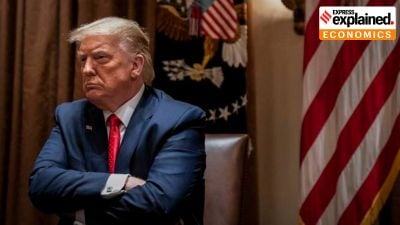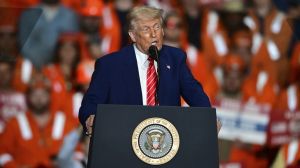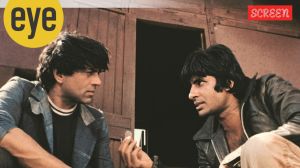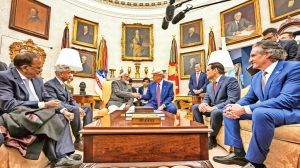Opposition states pass resolution at delimitation meet: Freeze Lok Sabha seats for another 25 years
Except Andhra, CMs, Dy CM of 4 south states attend; Mamata skips
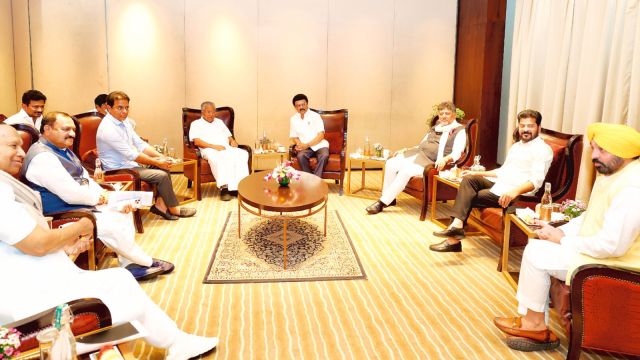 Tamil Nadu CM M K Stalin with Kerala CM Pinarayi Vijayan, Telangana CM Revanth Reddy, Punjab CM Bhagwant Mann, Karnataka Dy CM D K Shivakumar and BRS’s K T Rama Rao. PTI
Tamil Nadu CM M K Stalin with Kerala CM Pinarayi Vijayan, Telangana CM Revanth Reddy, Punjab CM Bhagwant Mann, Karnataka Dy CM D K Shivakumar and BRS’s K T Rama Rao. PTIDESCRIBING as “unclear and confusing” the promise of Union Home Minister Amit Shah that southern states will not lose a single seat in the Lok Sabha on a pro rata basis after delimitation, a Joint Action Committee for Fair Delimitation (JAC) led by Tamil Nadu Chief Minister MK Stalin passed a resolution demanding that the “freeze on Parliamentary constituencies based on 1971 Census Population should be extended by another 25 years”.
The gathering of at least four CMs (Tamil Nadu, Telangana, Kerala and Punjab), Deputy Chief Minister of Karnataka, and senior political leaders from multiple states including Odisha and Andhra Pradesh, raised a unified voice against the proposed delimitation process, arguing it would disproportionately benefit the northern, Hindi-speaking states at the expense of the south and some other regions.
“This is not just about numbers; this is about our power, our rights, and our future,” Stalin said as he opened the meeting, setting the tone for the day’s deliberations. He warned that the proposed population-based delimitation would punish states that have implemented successful welfare and population control policies, stripping them of parliamentary representation and weakening their political voice at the centre.
Notably absent at the meeting were representatives from the Trinamool Congress (TMC) and Telugu Desam Party (TDP) which is in power in Andhra Pradesh and the YSR Congress, though the latter later wrote a letter to Prime Minister Narendra Modi on Saturday backing the committee’s concerns.
The current representation in the Lok Sabha, frozen since 1971, maintains a balance of representation, but a new census-based delimitation could shift political power to northern states with higher birth rates, altering the balance in favour of those which have not achieved population control goals.
Based on the Census of 1971, the number of Lok Sabha seats was fixed at 543, which meant that each MP represented roughly 10 lakh Indians. (The number of Lok Sabha seats was earlier fixed at 494 and 522 after the censuses of 1951 and 1961, respectively.) The Constitution (Forty-second Amendment) Act, 1976 – passed by the government of the Emergency focused on efforts to control India’s population – froze the number of Lok Sabha seats until after the first Census taken after 2000. And in 2002, the Atal Bihari Vajpayee government extended the freeze until at least 2026.
Framing the issue stark political terms, Punjab Chief Minister Bhagwant Mann said, “The BJP wants to reduce the seats of states where they are losing and increase the seats in states where they are winning. Only the Hindi-speaking states will benefit from this exercise.”
Former Chief Minister of Odisha, Naveen Patnaik, who addressed the meeting virtually, reinforced the argument that states should not be penalised for successfully implementing national population control policies. He called for a national discussion on the issue before any delimitation is carried out, stressing it would be unfair to ignore the contributions of states that had followed the Centre’s guidelines for decades.
Throughout the meeting, speakers, one after the other, framed the delimitation issue as an assault on federalism. Kerala Chief Minister Pinarayi Vijayan warned that the BJP-led government was deliberately pushing ahead with delimitation even before conducting the Census, suggesting the process was being engineered to benefit its political prospects.
“Federalism is not a gift from the Center. It is the right of our states,” Vijayan said. He accused the BJP of carrying out the delimitation process with a narrow political mindset, warning that such centralisation of power would marginalise cultural and linguistic diversity in India.
While the gathering largely focused on opposing the impending delimitation, several leaders also proposed alternative solutions. Telangana Chief Minister Revanth Reddy argued that if the Center was insistent on delimitation, the share of parliamentary seats allocated to the five southern states should be increased to 33% from the current 24%. He vowed to introduce a resolution in the Telangana Legislature demanding fair representation.
K T Rama Rao (KTR), leader of the Bharat Rashtra Samithi (BRS), backed this and put forth an even bolder idea: “If the South contributes 36% of India’s GDP, why not give it 36% of voice in Parliament?” He suggested freezing the current Lok Sabha seat distribution permanently, or at the very least, ensuring that the existing representation balance remained intact.
Karnataka Deputy Chief Minister D K Shivakumar (DKS) took the discussion a step further, advocating for a strengthened Rajya Sabha as a counterbalance to the Lok Sabha, ensuring that states continue to have a voice even if their representation in the lower house is reduced. He warned that the BJP’s delimitation push was not a mere technical adjustment but a political assault designed to shift power away from the southern states.
At the end of the meeting, besides demanding a 25-year freeze on the number parliamentary constituencies, the JAC resolution also called for greater transparency in the delimitation process, mandatory consultation with state governments, and constitutional amendments to protect states with declining population shares.
Additionally, the JAC announced that a Core Committee of Members of Parliament would be formed to coordinate legislative strategies against the Union Government’s delimitation efforts. The committee will also submit a joint representation to Prime Minister Narendra Modi, urging him to reconsider the proposal.
The JAC’s decision to hold its next round of discussions in Hyderabad, as proposed by Telangana CM Reddy, signals that the opposition to delimitation is gaining momentum. Punjab CM Mann has also extended an invitation to host a subsequent meeting in Punjab.
While the BJP has yet to formally respond to the JAC’s demands, Union Home Minister Amit Shah’s recent statement in Tamil Nadu that southern states will not lose representation on a “pro-rata basis” has done little to reassure critics as Tamil Nadu and its allies in JAC see ‘pro-rata’ as a vague term. “What is this pro-rata basis that Shah is talking about,” Kerala CM Vijayan asked. DMK MP Kanimozhi who briefed the media about the decisions and resolution of JAC also said Shah’s statement that Tamil Nadu will not be affected on a pro rata basis “confirms their plan to enforce it soon” without giving “any official clarity.”
Stalin, in his speech, pointed out that Shah’s vague assurances only confirmed fears that the BJP was unwilling to give a formal commitment against the plan. “This move is going to punish such (progressive) states. By reducing
the number of people’s representatives, our voice will be muffled. For two years, Manipur has been burning. But their voices for justice are being ignored—because they do not have the political strength to attract the attention of the country. Therefore, the reduction in the number of parliamentary seats or the reduction in our representation would invariably lead to a reduction in our political strength,” Stalin said in his speech.
However, on the sidelines of the meeting, top DMK sources also shared their thoughts about JAC’s ability to sustain momentum amid challenges in building a truly national coalition against delimitation — they cited the absence of the TMC and the YSR Congress. Nevertheless, the meeting marked a rare moment of unity among regional parties, many of whom have historically been at odds.
“This is not about dividing the country. It is about fairness,” said DMK MP Kanimozhi. The response received by the DMK government to JAC from different states was “overwhelming.” “This is not to divide… We are not against anyone else’s rights. But we refuse to be punished for governing well,” she said.


